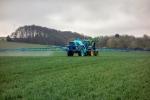H2020 KNOWPEC Project: Knowledge for Pesticide Control
- Type Project
- Status Filled
- Execution 2016 -2022
- Assigned Budget 526.500,00 €
- Scope Europeo
- Main source of financing Horizon 2020
- Project website KNOWPEC
KNOWPEC's work packages focused on three main disciplines: pesticide occurrence assessment, toxicity and environmental risk assessment of the pesticides present, and pesticide remediation through advanced water treatments.
Specifically, the work packages produced the following scientific achievements:
Work Package 1 developed and validated analytical methods for the determination of several pesticides in water samples, including samples from 10 wells in northeastern Greece. Simultaneously, several pesticide analytical methods previously used by CICA were improved and implemented. Finally, CICA staff worked on the removal of terbuthylazine from agricultural wastewater in two different bioremediation systems.
Work package 2 involved conducting a cumulative risk assessment for aquatic organisms using measured pesticide data from Bolivian streams (Pucara Basin, Cochabamba). It also included training activities on conducting ecotoxicity studies of pesticide mixtures using representative samples of pesticide-contaminated water from Costa Rica and using these measured data to develop predictive cumulative risk assessments in surface waters (La Mula and Machuca-Jesús María).
The research work of Work Package 3 focused on the use of solar radiation for pesticide removal (naturally or through assisted processes). A significant portion of the experimentation was validated at the pilot plant scale and in situ (Cochabamba, Bolivia). Among the processes studied, the use of certain fertilizers as an iron source for the catalytic photo-Fenton reaction with solar radiation yielded good results in the depletion of pesticides from water.
At the same time, three multidisciplinary workshops were successfully organized: first in Costa Rica (February 2017), second in Argentina (February 2018), and third in Bolivia (February 2019). In all workshops, an average of 25 to 100 researchers from different disciplines and social actors (academics, government, private companies, agricultural organizations, etc.) participated in each session.
Through field trips and workshops, KNOWPEC brought together pesticide experts from Latin America and Europe to study the entire pesticide supply chain (import and export, trade, application, plant protection efficacy, residues, monitoring, remediation, and risk). It planned various activities (research, workshops, field visits, stakeholder meetings, etc.) to better understand the common and specific problems in each country. The results were used to conduct a reliable diagnosis of the problem in selected areas, identifying the presence and fate of pesticides in natural waters, conducting toxicity assessments, and proposing general guidelines for a national pesticide prioritization and monitoring scheme with the ultimate goal of protecting water bodies in Latin American countries.
The results of KNOWPEC have been presented at eight international conferences specializing in pesticide contamination control and published in eight peer-reviewed international journals.
KNOWPEC, Knowledge for Pesticide Control, aimed to create a transnational research network between Europe and Latin America focused on the challenge of unwanted pesticides in the environment. KNOWPEC was funded by the EU Marie Skłodowska-Curie Actions, Research and Innovation Personnel Exchange (H2020-MSCA-RISE-2015).
The primary objective of KNOWPEC was to identify the presence and fate of banned and other toxic pesticides in drinking and natural waters in agricultural areas of Latin America where knowledge about their presence and risk is scarce. KNOWPEC aimed to assess the potential environmental and human risks of the detected pesticides and provide solutions both to reduce contamination at source and to remediate contaminated water. Together, KNOWPEC promoted knowledge sharing at every stage, from pesticide analysis, toxicity, and risk assessment to advanced water treatment technologies that jointly enabled the design of sustainable solutions for each pesticide contamination problem.
KNOWPEC contributed to a greater understanding of pesticide contamination in drinking and natural waters in selected regions of Latin America by providing typical (or exemplary) examples of widespread agricultural practices and ecological regions. This, along with the training of future specialists by a network of experts in chemical analysis, environmental toxicity, environmental risk assessment, and innovative water treatment technologies, also contributed to safeguarding drinking water supplies and providing solutions for sustainable food production and a sustainable environment, tailored to the economic and physical resources and needs of each country.
KKNOWPEC, Knowledge for Pesticide Control, aims to create a transnational research network between Europe and Latin America focused on the challenge of unwanted pesticides in the environment.
KNOWPEC aims to identify the occurrence and fate of toxic and prohibited pesticides in drinking and natural waters in agricultural areas of Latin America where knowledge about occurrence and risk is scarce. KNOWPEC aims to assess the potential environmental and human risks of the detected pesticides and provide solutions to both reduce contamination at source and remediate contaminated water.
Together, KNOWPEC will promote knowledge exchange at every step, from pesticide analysis, toxicity, and risk assessment to advanced treatment technologies that will enable the collaborative design of sustainable solutions for each pesticide contamination problem. Furthermore, we aim to create information and networking tools to serve as a source of collaboration between European and Latin American institutions in the context of environmental and human protection against pesticides.
KNOWPEC will make important contributions by increasing knowledge about pesticide contamination in drinking and natural waters in selected locations in Latin America, providing typical (or exemplary) cases of widespread agricultural practices and ecological regions. This, along with the application of the knowledge of a network of experts in chemical analysis, environmental toxicity and risk assessment, and innovative water treatment technologies in the training of future specialists, will contribute to safeguarding drinking water supplies and providing solutions for sustainable food production and a sustainable environment.
Problems related to water pollution, such as the presence of pesticides, continue to emerge and are of concern to scientists, governments, and local communities alike. Water quality and remediation have become crucial issues, even more urgent due to the declining availability of water resources worldwide. Furthermore, there are significant differences among Latin American (LA) countries in terms of registration, application strategy (chemical classes, quantities), policies (restrictions, remediation actions), and knowledge (environmental and human health risks) of pesticides in agriculture. However, some policies to minimize the risk of pesticides used originate in Europe and the United States, although the underlying approaches are based on specific national or regional scenarios. Consequently, the factors affecting the environmental fate and toxicity of pesticides in their own countries may be considerably underestimated. In short, there are serious gaps in knowledge about the extent of pesticide contamination in the natural waters of Central and South America, gaps that impede the development of effective policies aimed at protecting ecosystems and local populations.
KNOWPEC focused on important scientific objectives related to the characterization and control of pesticide contamination in different geographic regions of Latin America. The work developed enabled an innovative diagnosis of contamination and identified gaps in current environmental risk assessments of pesticides and their legislation. Furthermore, through the review of monitoring studies and interviews with farmers, agronomists, pesticide distributors, and environmentalists, we were able to categorize the main sources of contamination, both point and diffuse. In addition to the scientific aspects, the relocation of researchers between Europe and Latin America, and within them, highlighted cultural differences. These differences were important for understanding the extent to which existing regulatory and mitigation approaches could be adapted in different countries, as well as for future international collaborations.
Finally, the KNOWPEC project developed resource-efficient, economically advantageous, and host-country-relevant water treatment methods through the use of solar energy and bioprocesses. The project has thus contributed to positive environmental, social, and economic benefits, as the underlying objective is to use society's resources sustainably, addressing a fundamental societal concern. KNOWPEC ensured these objectives while also training new qualified researchers, which will bring added value to European and American research and industry.
- UNIVERSITAT DE BARCELONA (UB)






